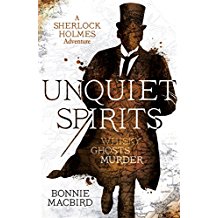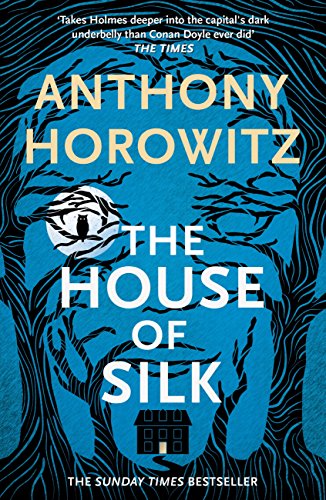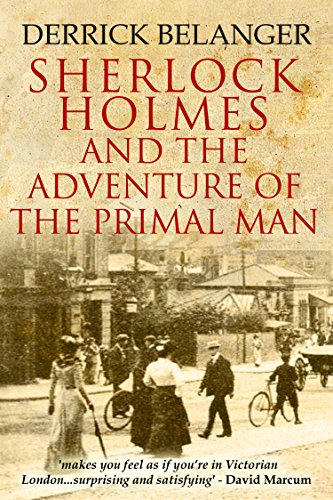Unquiet Spirits by Bonnie MacBird is a detective story set in 1889. It features suitably evil villains, a Scottish castle, a beautiful woman of mystery and possibly a ghost. It’s a jolly good read and I’ll happily recommend it to anyone who thinks that a book matching that general description is the sort of thing that might appeal.

It also features a detective called Sherlock Holmes. Does that make it any better than it would be anyway? Arguably not, but MacBird is riding a wave of Holmesian re-writes. Perhaps it is worth asking what distinguishes all these books and why they remain so popular.
In the past few weeks I’ve read three: this one, The House of Silk by Anthony Horowitz and Sherlock Holmes: The Adventure of the Primal Man by Derrick Belanger. There are many, many more with, as it were, ‘spin-offs’ like Laurie R King’s Mary Russell series, featuring a young girl who becomes the older Holmes’s protégé. And, though it’s a TV series and not a book, we can’t ignore Benedict Cumberpatch’s brilliantly presented re-imagining of the great detective in Sherlock.
Some of these writers go to great pains to capture the ‘voice’ of John Watson. Anthony Horowitz, in his essay on writing The House of Silk (which now appears in the paperback) says how important it seemed to him to get that voice right and I certainly felt I was reading something very close to the original. MacBird, by contrast, doesn’t read remotely like John Watson and neither does Belanger, who happily has Watson put the word ‘trash’ into Holmes’s Victorian mouth. King gets round the problem by writing not as Watson but as Mary Russell, which works well but means that there is no possibility of mistaking the books for anything Doyle might have written.

The fact that most Holmesian homages don’t read at all like the originals does not detract from their popularity and, though purists may carp, it doesn’t really spoil Unquiet Spirits. So, if the narrator’s voice (or, with King’s books, the narrator) isn’t what matters, what does?
Is it the character of Sherlock Holmes himself? Possibly. But what do we mean by the ‘character’ of Holmes? In this post-Trainspotting era, both MacBird and Horowitz make a point of having a drug-free hero and Belanger goes so far as to have had Holmes take up meditation in Tibet to explain the absence of drugs in his story. Holmes was always physically fit, but MacBird has him leaping “gazelle-like” over the furniture in his flat, which seems unlike the more cerebral figure that Doyle’s Holmes usually cuts at home. When I close my eyes and think of MacBird’s Holmes, I must admit I see Benedict Cumberpatch.
Arguably, it is not the physical manifestation of Holmes that draws us to such stories. Isn’t the most important thing watching the deductive powers of the “human calculating machine” at work? Horowitz presumably thinks so: he provides several examples of the parlour tricks that Holmes loves to play on visitors.
“I can tell that you have just returned from Holburn Viaduct. That you left your house in a hurry, but even so missed the train. Perhaps the fact that you are currently without a servant girl is to blame.”
MacBird offers fewer of these coups de theatre and, when Holmes attempts them, he is often proved wrong. (Even Horowitz has him make the odd mistake: the 21st century is much more sceptical of genius than the 19th.) MacBird, I think, does herself no favours by cutting back on this element of the original books. They are fun, and part of the definition of the genre, but they are clearly not absolutely essential to Holmes’s character.
So what is the essence of Sherlock Holmes?
Oddly enough, I think the clearest contemporary comparison is with Batman. Batman was first introduced to the world in Detective Comics in 1939 and is often referred to as “the greatest detective”. More importantly, though, he is not a super-hero, but a man who has achieved greatness by rigorous training and commitment to his cause: fighting crime and destroying evil. He has thus reached almost super-human standards of excellence in his crime-fighting role. He has a tragic past and is now isolated from most regular social interaction, except with his side-kick, Robin, and his butler, Alfred, who attends to his practical daily needs. He has no meaningful relationships with women and his past is shrouded in tragedy.
Holmes, like Batman, appeals because he represents what humans can achieve by sheer application. He has become great, reaching standards of analytical reasoning that appear almost magical. This almost mystical persona is enhanced by the fact that he has no regular social relationships and we see him through the prism of his faithful side-kick, Watson. He doesn’t have to worry about his practical daily needs, because these are met by Mrs Hudson. He has no meaningful relationships with women and his past is shrouded in tragedy.
Both Batman and Holmes have attained almost mythic status in their respective literary worlds, because the figure they represent touches on a Platonic ideal of the ideal man (and both figures are men – female Bats and Holmes are occasionally imagined but never threaten the original). Human, yet separated from common humanity, born out of tragedy and doomed to an isolated existence, dedicated to serving the common good, Holmes, like Batman, is a mythic archetype.
MacBird’s Holmes measures up in many ways and she devotes a significant part of the story to probing his tragic past. On the one hand, this builds on the myth by confirming what we all suspected: Holmes’s past was, indeed tragic. On the other hand, by spelling out the details, some of the mythic element is lost. Holmes is no longer some sort of uber-mensch forged from tragedy, but a rather sad and solitary individual who has never recovered from the murder of his first love. Holmes’s back-story, although woven into the main narrative, isn’t necessary and, far from making Unquiet Spirits a seminal part of the Holmesian canon, it detracts from the traditional view of the great detective.
Horowitz seems more assured. As with Doyle, Holmes is front and centre of the story, his character always observed through the often adulational eyes of the trusty Watson. His Holmes is always more weighed down by his failure to protect everyone whose paths he crosses than it is buoyed up by his successes. He is a tragic figure rather than (as with MacBird’s Holmes) a figure shaped by a specific tragedy.
Belanger’s Holmes is hardly tragic at all. The hero of The Adventure of the Primal Man is just a very clever man who shares Holmes’s name and address but adds nothing to the canon. It’s a lightweight piece compared with House of Silk or Unquiet Spirits, but it represents the way that Holmes keeps popping up in contemporary literature when an author needs a great detective and a period setting. They don’t develop the character of Sherlock Holmes, but may be no less entertaining for that. And at least Belanger hasn’t given Holmes a girlfriend.

Holmes, then, turns up in contemporary literature (not to mention films and TV) in a variety of guises ranging from a careful recreation of Doyle’s hero to a generic Victorian, or early Edwardian, detective, to a reimagining for the 21st century (possibly complete with bat costume). What is the appeal? It’s not Doyle’s literary genius. The stories are well-written and workmanlike, but Doyle himself despised them, hence the Reichenbach Falls where he tried to put an end to the character once and for all. (Doyle thought his literary heritage would be a series of historical novels set in the 14th century. They were quite popular, but have not stood the test of time.)
In the end, Holmes represents certainty: the triumph of good over evil by the application of rational thought. He is a god-like figure for a scientific age. Born in a time when people believed, apparently with good reason, that the problems of the world could be solved by scientific progress, he has become, paradoxically, more popular when the most casual glance at a newspaper suggests that the world’s problems are insoluble. We need to believe that out there somewhere there may be somebody who can apply his mind to any problem and come up with an answer that is not only correct, but has been obtained by a process of rational reasoning. Holmes always gets the answer by logic, rather than luck, and Watson – representing us mere mortals – always spells out the details of Holmes’ reasoning so that we can see that no magic has been involved.
Ironically, Doyle himself believed in spirits and was taken in by the most amateur of faked photographs of fairies. Those who know his life story may feel sympathy (his belief in spiritualism was driven by the loss of his son in World War I) or we may mock. But in either case, we are likely to cling all the harder to the philosophy of Rationalism and seek out another story based in the extraordinary powers of the mind of the Great Detective.
This article first appeared on the website of the Historical Novel Society.

Great post! I’ve often pondered Doyle’s occult investigations with Holmes’ “pure logic.” We are not our characters, right?
Yes. Doyle was a long-time believer in Spiritualism. He did try to investigate it critically, but he was easily fooled. The fairy photographs he endorsed as real were pretty flagrant fakes. The strength of his spiritualist beliefs increased because of the horror of the First World War (in which he lost his son) but he had dabbled with spiritualism long before that.